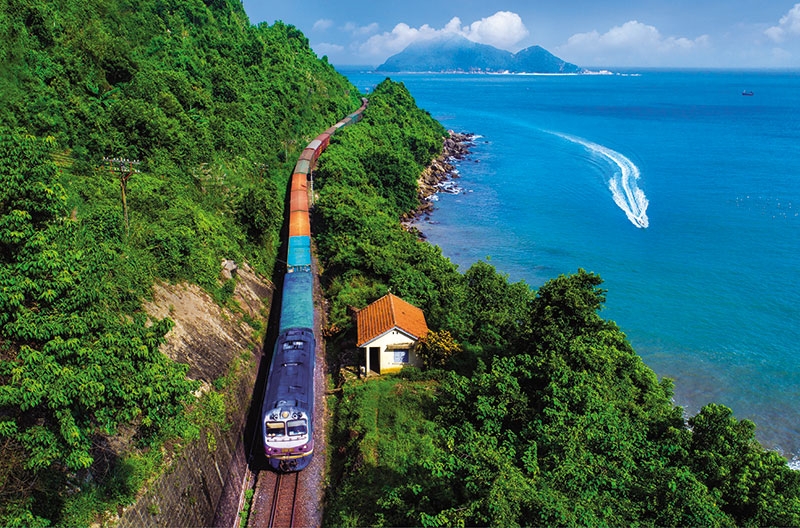Vietnam Railways to dump its cargo
 |
| Vietnam Railways to dump its cargo |
The Ministry of Transport (MoT) is now in the final stages of assessing Vietnam Railways’ (VNR) restructuring and divestment plan for 2017-2020, before submitting its report to the government for approval next month.
An end to the cargo transport monopoly
One of the highlights of the plan, proposed by VNR itself, is the merger of Hanoi Railway Transport JSC and Saigon Railway Transport JSC into one joint stock company (JSC). This JSC will be then separated into two entities, with one specialising in passengers, in which VNR will hold a controlling stake, and the other focusing on cargo transport, with VNR to possibly divest the entire state stake.
Currently, Hanoi Railway Transport JSC and Saigon Railway Transport JSC are the biggest operators of cargo transport in the industry.
“If approved, we could call on private investors to join and promote the development of cargo transportation, thus enabling it to compete with other transport segments, including aviation and road,” VNR chairman Vu Anh Minh told VIR.
The move comes after years of low operational efficiency at the two railway transport units.
According to the Ministry of Finance’s Document No.9280/BTC-TCDN, recently sent to the MoT, both Hanoi Railway Transport JSC and Saigon Railway Transport JSC have showed poor performance, and their competiveness has plummetted compared to aviation, road, and waterway transport.
As shown in the document, in 2017, VNR’s total revenue rose by 15 per cent on-year to reach VND7.77 trillion ($343.8 million), but its profit declined by 16 per cent to VND145 billion ($6.4 million), mainly because of a loss of VND88 billion ($3.89 million) at Hanoi Railway Transport JSC. Saigon Railway Transport JSC performed better than its Hanoi peer, but results remained lower than expected.
“These two companies are offering the same products and services and compete with each other, increasing the employed labour force but decreasing their productivity, competitiveness, and operational efficiency,” Minh explained.
“For example, as the industry’s running capacity is 21 couples of trains, one company is able to handle this number. But with two units, they reduced prices to attract passengers and customers, resulting in losses,” he said.
The proposal is expected to result in a breakthrough in VNR’s future operations, as the company reported low yearly profits of around VND150 billion ($6.64 million) for the past three years, partly due to the burden of numerous non-business lines on 100-year downgraded infrastructure.
At present, VNR is tasked with managing and maintaining the railway infrastructure network, while also monitoring railway transport and leasing railway assets.
As stated by the World Bank, nations which have separated the passenger and cargo transport businesses in their railway networks have proved efficient.
The MoT is also supporting VNR’s proposal. “The merger is necessary and the stake divestment in the cargo transport unit is an indispensable choice for long-term development. We expect better performance with the involvement of private investors,” said MoT Deputy Minister Nguyen Ngoc Dong.
With this new move, the railway industry is expected to receive new life in its private investment on the back of new policies and legislation.
The Law on Railways 2017, which entered into force in July 2018, introduces unique preferential mechanisms on import duty, corporate income tax, land use, and concessional loans, while Decree No.63/2018/ND-CP dated June 19, 2018 supports railway projects in the form of public-private partnerships (PPP).
What is more, the recently issued Decree No.46/2018/ND-CP governing the management and use of railway infrastructure assets will give VNR the right to own, use, and develop the assets indirectly involved in train operation with state capital recorded in the business, enabling it to take the initiative in its investment plan and to call on more favourable private investments.
 |
| The MoT is in the final stages of assessing VNR’s restructuring and divestment plan, Source: VNR |
Who will benefit?
According to Vaibhav Saxena of Vietnam International Law Firm, in the past, since urban railway projects were merely aimed at serving the needs of locals and foreign investors concentrated on incentives and returns on their investment, projects in the urban railway industry could not attract foreign investment and were mainly invested by state-owned enterprises.
However, with increasing attention from the government, foreign investors are more keen to invest in the urban railway development sector.
“In fact, the natural and geographical conditions of Vietnam are a win-win factor for the development of the railway network. Furthermore, the urban railway business is expected to receive ample support from the government. As the government has relaxed the limitations, a new investment arena has emerged for investors to explore,” said Saxena.
These moves are expected to back the expansion plans of Lotte Engineering and Construction Co., Ltd. (Lotte E&C), a subsidiary of Lotte Group, South Korea’s fifth largest corporation.
“We have come on board with construction projects in Vietnam in recent years. We will now expand operations in the country with a focus on railways, metro lines, and other transport infrastructure projects,” said Ha Suk Joo, president of Lotte E&C.
In a similar move, Siemens Group is also seeking opportunities to join several road and railway projects in Vietnam, while a number of foreign investors such as Russia’s EVRAZ–the world’s largest producer of rails–and Russia Export Centre Group have recently expressed interest in doing business with VNR.
Attracting foreign investment into the railway industry is a challenge not only in Vietnam, but worldwide.
The question is now whether VNR’s move and the country’s new policies and legislation are enough to help brighten the picture of private investment attraction in the industry.
What the stars mean:
★ Poor ★ ★ Promising ★★★ Good ★★★★ Very good ★★★★★ Exceptional
 Tag:
Tag:
Related Contents
Latest News
More News
- Vietnamese businesses diversify amid global trade shifts (February 03, 2026 | 17:18)
- Consumer finance sector posts sharp profit growth (February 03, 2026 | 13:05)
- Vietnam and US to launch sixth trade negotiation round (January 30, 2026 | 15:19)
- NAB Innovation Centre underscores Vietnam’s appeal for tech investment (January 30, 2026 | 11:16)
- Vietnam moves towards market-based fuel management with E10 rollout (January 30, 2026 | 11:10)
- Vietnam startup funding enters a period of capital reset (January 30, 2026 | 11:06)
- Vietnam strengthens public debt management with World Bank and IMF (January 30, 2026 | 11:00)
- PM inspects APEC 2027 project progress in An Giang province (January 29, 2026 | 09:00)
- Vietnam among the world’s top 15 trading nations (January 28, 2026 | 17:12)
- Vietnam accelerates preparations for arbitration centre linked to new financial hub (January 28, 2026 | 17:09)






















 Mobile Version
Mobile Version